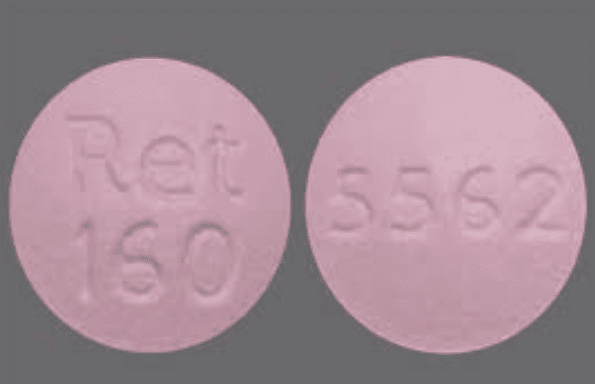Retevmo Disease Interactions
There are 7 disease interactions with Retevmo (selpercatinib).
- Bleeding
- Hypertension
- ILD/pneumonitis
- Liver dysfunction
- Tumor lysis syndrome
- Selpercatinib – arrhythmias
- Selpercatinib – renal dysfunction
Selpercatinib (applies to Retevmo) bleeding
Moderate Potential Hazard, Moderate plausibility.
Serious including fatal hemorrhagic events can occur with the use of selpercatinib. Care should be exercised when using this agent in patients with bleeding disorders. It is recommended to permanently discontinue treatment in patients with severe or life-threatening hemorrhage.
Selpercatinib (applies to Retevmo) hypertension
Moderate Potential Hazard, Moderate plausibility.
Selpercatinib may cause hypertension and therapy should not be initiated in patients with uncontrolled hypertension. Care should be exercised when using this agent in hypertensive patients. Optimize blood pressure before starting treatment. It is recommended to monitor blood pressure after 1 week, and regularly as clinically indicated. Initiate or adjust anti-hypertensive therapy as appropriate. Withhold, reduce dose, or permanently discontinue treatment based on the severity.
Selpercatinib (applies to Retevmo) ILD/pneumonitis
Moderate Potential Hazard, Moderate plausibility. Applicable conditions: Interstitial Pneumonitis
Selpercatinib may cause severe, life-threatening, or fatal interstitial lung disease (ILD)/pneumonitis. Monitor for new or worsening pulmonary symptoms. Withhold therapy and promptly investigate acute or worsening respiratory symptoms suggestive of ILD/pneumonitis (e.g., dyspnea, cough, and fever).
Selpercatinib (applies to Retevmo) liver dysfunction
Moderate Potential Hazard, Moderate plausibility. Applicable conditions: Liver Disease
Selpercatinib is metabolized predominantly by CYP450 3A4. The dose of selpercatinib should be reduced in patients with severe hepatic impairment. No dosage modification is recommended for patients with mild or moderate hepatic impairment. Serious hepatic adverse reactions have been reported in patients treated with selpercatinib. Monitor ALT and AST before starting therapy with selpercatinib, every two weeks during the first three months, then monthly thereafter and as clinically indicated. It is recommended to withhold, reduce dose or permanently discontinue treatment based on the severity of selpercatinib-related adverse reactions in patients with hepatic impairment.
Selpercatinib (applies to Retevmo) tumor lysis syndrome
Moderate Potential Hazard, Moderate plausibility. Applicable conditions: Renal Dysfunction
Tumor lysis syndrome has been reported with use of selpercatinib in patients with medullary thyroid carcinoma. Patients with rapidly growing tumors, a high tumor burden, renal dysfunction, or dehydration who take selpercatinib may be at increased risk. Closely monitor at-risk patients and consider appropriate prophylaxis, including hydration.
Selpercatinib – arrhythmias
Moderate Potential Hazard, Moderate plausibility. Applicable conditions: Hypokalemia, Magnesium Imbalance, Hypocalcemia, Electrolyte Abnormalities, Thyroid Disease, Long QT Syndrome, Cardiovascular Disease, Congestive Heart Failure, History - Myocardial Infarction
Selpercatinib can cause concentration-dependent QT interval prolongation. Monitor patients who are at significant risk of developing QTc prolongation, including patients with known long QT syndromes, clinically significant bradyarrhythmias, and severe or uncontrolled heart failure. This drug has not been studied in patients with clinically significant active cardiovascular disease or recent myocardial infarction. Assess QT interval, electrolytes, and TSH at baseline and periodically during treatment, adjusting frequency based upon risk factors, including diarrhea or drug interactions. Correct hypokalemia, hypomagnesemia, and hypocalcemia prior to initiating therapy.
Selpercatinib – renal dysfunction
Moderate Potential Hazard, Moderate plausibility.
A recommended dose of selpercatinib has not been established for patients with end-stage renal disease. No dosage modification is recommended for patients with mild to severe renal impairment. The use of selpercatinib may increase serum creatinine. It is recommended to consider alternative markers of renal function if persistent elevations in serum creatinine are observed.
Switch to professional interaction data
Retevmo drug interactions
There are 635 drug interactions with Retevmo (selpercatinib).
Retevmo alcohol/food interactions
There are 2 alcohol/food interactions with Retevmo (selpercatinib).
More about Retevmo (selpercatinib)
- Retevmo consumer information
- Check interactions
- Compare alternatives
- Pricing & coupons
- Reviews (4)
- Drug images
- Side effects
- Dosage information
- During pregnancy
- FDA approval history
- Drug class: multikinase inhibitors
- Breastfeeding
- En español
Related treatment guides
Drug Interaction Classification
| Highly clinically significant. Avoid combinations; the risk of the interaction outweighs the benefit. | |
| Moderately clinically significant. Usually avoid combinations; use it only under special circumstances. | |
| Minimally clinically significant. Minimize risk; assess risk and consider an alternative drug, take steps to circumvent the interaction risk and/or institute a monitoring plan. | |
| No interaction information available. |
See also:
Further information
Always consult your healthcare provider to ensure the information displayed on this page applies to your personal circumstances.


